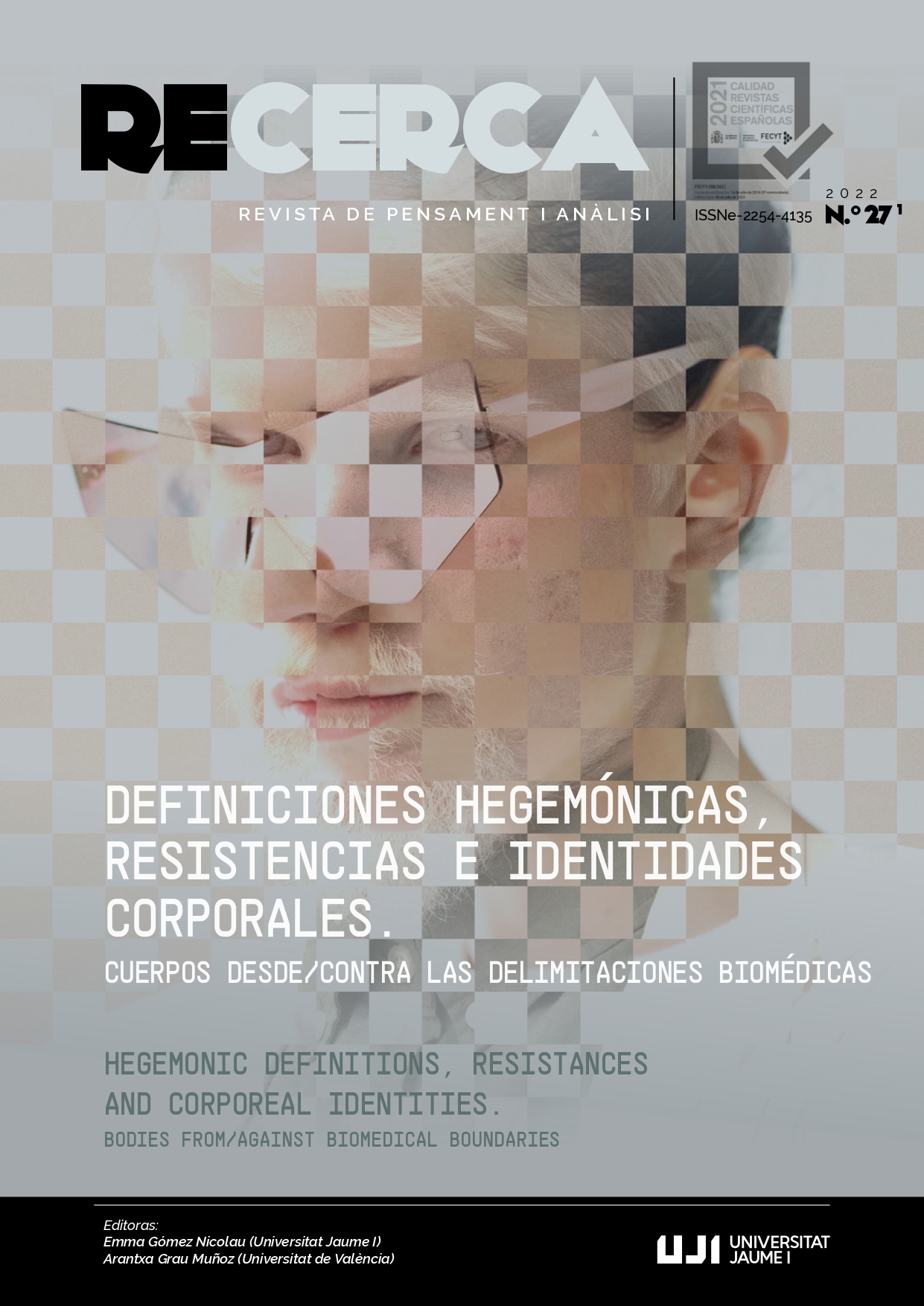Theorizing immune inhibition and TNF inhibitors from the autoimmune
Contenido principal del artículo
Resumen
En este artículo se analizan los inhibidores del factor de necrosis tumoral (tnf) como objeto bioquímico desde la perspectiva de la vivencia con una enfermedad autoinmune. El artículo trata de desentrañar cómo el concepto de inmunoinhibición se usa junto con los inhibidores de tnf como objeto bioquímico para definir y narrar lo que puede significar la salud y la enfermedad, lo normal y lo patológico, la curación y la sanación en el contexto de cuerpos autoinmunes. En concreto, y dentro del marco patológico de las enfermedades autoinmunes, el tratamiento farmacológico de inhibición del tnf (factor de necrosis tumoral) está diseñado para suprimir el sistema inmunitario demasiado activo, actuando así como un agente bioquímico negativo o supresor destinado a reequilibrar el mal funcionamiento del sistema inmunitario. Como puede verse en la coyuntura actual, los fármacos inhibidores del tnf sitúan oficial —y gubernamentalmente— a quienes los toman en un grupo de riesgo ya que rebajan su inmunidad corporal global y les hace más vulnerables a enfermedades infecciosas, mientras que estabilizan su condición patológica de sobreinmunidad desinhibida. En parte narración de la experiencia personal de ser diagnosticado con una condición autoinmune, en parte teoría autoinmune especulativa inspirada por tal diagnóstico, el artículo en última instancia explora una forma de encarnación diferente que no sea negativa ni afirmativa y, sin embargo, sea resistente incluso a sí misma.
Descargas
Detalles del artículo
Citas
Agamben, Giorgio (2005). The time that remains: A commentary on the Letter to the Romans. Stanford University Press, 2005.
Aggarwal, Bharat B., Gupta, Subash C. and Kim, Ji Hye (2012). Historical perspectives on tumor necrosis factor and its superfamily: 25 years later, a golden journey. Blood, 119(3), 651-665.
Braidotti, Rosi (2019). A Theoretical Framework for the Critical Posthumanities. Theory, Culture & Society, 36(6), 31-61.
Canguilhem, Georges (1991). The Normal and the Pathological. Zone Books.
Cohen, Ed (2017). Self, Not-Self, Not Not-Self But Not Self, or The Knotty Paradoxes of ‘Autoimmunity’: A Genealogical Rumination. Parallax, 23(1), 28-45.
Derrida, Jaques (1981). Dissemination. The University of Chicago Press.
Ferri, Beth A. (2018). Metaphors of Contagion and the Autoimmune Body. Feminist Formations, 30 (1), 1-20.
Foucault, Michel (2007). Security, Territory, Population: Lectures at the Collège de France, 1977-1978. London: Palgrave Macmillan.
Foucault, Michel (2008). The Birth of Biopolitics: Lectures at the Collège de France, 1978-1979. Basingstoke: Palgrave MacMillan.
Frost, Samantha (2016). Biocultural Creatures: Toward a New Theory of the Human. Duke University Press.
Haraway, Donna (1988). Situated Knowledges: The Science Question in Feminism and the Privilege of Partial Perspective. Feminist Studies, 14(3), 575-599.
Hobbes, Thomas (1651). Leviathan or The Matter, Form and Power of a Common-Wealth Ecclesiasticall and Civil. London.
HUMIRA, A Biologic Treatment Option (2020). Taken from https://Www.Humira.Com/ (accessed 7 August, 2020).
Lavaert, Sonja and Gielen, Pascal (2009). The Dismeasure of Art. An interview with Paolo Virno. In Gielen, Pascal and De Bruyne, Paul (eds.). Arts in Society. Being an Artist in Post-Fordist Times (17-44). NAi Publisher.
Lemke, Thomas (2011). Beyond Foucault. In Ulrich Bröckling, Susanne Krassmann y Thomas Lemke (comps.). Governmentality. Current issues and future challenges (165-184). New York & London: Routledge.
Montfort, Anne et al. (2019) The TNF Paradox in Cancer Progression and Immunotherapy. Frontiers in immunology, 10, 1818.
Nobel Prizes (2018). NobelPrize.Org. Taken from www.nobelprize.org/prizes/medicine/2018/press-release (accessed 7 August, 2020).
Pardoll, Drew M. (2012). The blockade of immune checkpoints in cancer immunotherapy. Nature reviews. Cancer, 12(4), 252-264.
Rajan, Kaushik Sunder (2021). Multisituated: Ethnography as Diasporic Praxis. Duke University Press.
Schmitt, Carl (2006 [1950]). The Nomos of the Earth in the International Law of the Jus Publicum Europaeum. Telos Press Publishing.
Solomon, Daniel H., Mercer, Emileigh and Kavanaugh, Arthur (2012). Observational studies on the risk of cancer associated with tumor necrosis factor inhibitors in rheumatoid arthritis: a review of their methodologies and results. Arthritis and rheumatism, 64(1), 21-32.
Steeland, Sophie, Libert, Claude and Vandenbroucke, Roosamarjin E. (2018). The New Venue of TNF Targeting. International journal of molecular sciences, 19(5), 1442.
Tisoncik, Jennifer et al. (2012). Into the eye of the cytokine storm. Microbiology and molecular biology reviews: MMBR, 76(1), 16-32.
Urquhart, Lisa (2020). Top product forecasts for 2020. Nature Reviews Drug Discovery, 19, 86.
Virno, Paolo (2008). Multitude between innovation and negation. Semiotext(e).
Virno, Paolo (2018). An Essay on Negation: For a Linguistic Anthropology. Seagull Books.
Wang, Xia and Lin, Yong (2008). Tumor necrosis factor and cancer, buddies or foes? Acta pharmacologica Sinica, 29(11), 1275-1288.


